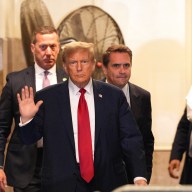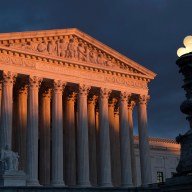When Tim Tebow plays, I see 1950s football. I don’t just mean that sort of football where a quarterback only attempts eight passes a game, completing two of them and it’s all great fun. I also mean flat-top haircuts, soda fountains and cherry-red T-Birds. Tebow’s style reminds me of Bobby Layne — the leadership, the underdog spirit, the wobbling passes, the wholesome smile. In those breathtaking moments when the former Broncos QB abandons all pretense of being a traditional passer and starts up his goofy underhand delivery, it feels as if he’s thumbing his nose at the whole notion of the perfect, streamlined, corporate athlete.
All of that is why, to me, Tebow seems to have a deeply Red State approach to the game. I’m not saying that a white QB who stands in the pocket isn’t a true American. I’m saying Tebow’s style is so vintage, so anachronistic, so white-teethed, so apple-cheeked, so out of touch with the way we pointy-headers on the coasts think the world should work — so representative of heartland American style — that if there were a stat for nostalgia points, Tebow would be the No. 1 quarterback in the league by far.
Religion is an undeniable and complex element of Tebow’s story, both because of his style as well as the rarity of QBs in the NFL who put their spiritual life as front-and-center as Tebow does. But after his trade to the New York Jets, the closest thing the NFL has Sodom and Gammorah, so many people asked: Would a football player who grew up in New York, among the hordes of filthy, foulmouthed and proudly debased Gang Green fans, ever be so proudly white-bread?
This question makes me cringe. It is so facile, naive, shortsighted and flawed that it is meaningless. New York is a cosmopolitan place, but it’s hardly a godless den of sin. There’s room is this city for folks of all religious persuasions. I’m certain that an athlete raised by parents as God-fearing as Tebow’s would still pray just as publicly, no matter what borough he was born in.
The problem with the “plant Tim Tebow in the middle of Staten Island” test runs much deeper than that. It fails to take into account that changing the culture a person is born into changes his entire existence. In making Tebow a New Yorker, you have him born to different parents. That alone sets his life trajectory in an entirely different direction. Thus when this hypothetical Jersey Shore Tim Tebow … wait, I can’t even continue that sentence in good faith. I mean, who would this GTL-ing Tim Tebow be? That person is unknowable. When you alter his his beliefs it’s like those Back to the Future movies where someone goes back in time, inadvertently changes one small thing about his parents’ dating history and then the person starts to disappear. If Tebow had been born to Jets fans, you wouldn’t even be reading this right now. That Tebow would have had radically different outlooks in life compared with the Tebow who grew up in the evangelical culture of Jacksonville, where he was home-schooled until a scholarship brought him to the University of Florida.
This is not to say there aren’t insights to be gained from hypotheticals. One pertinent question: Would a New Yorker have been as sequestered from secular culture, his missionary zeal normalized to the extent that he builds it into his life after he joins the NFL? It’s possible, but it’s far less likely because what makes Tebow stand out among all of the outwardly Christian players in the NFL is less his brand of faith than his willingness to hold himself up (or let others hold him up) as a totem in our eternal culture wars. The fame a starting NFL quarterback attracts gave Tebow a bully pulpit that his string of “miraculous” comebacks only magnified. Would a kid who grew up in New York’s crappy outer boroughs, among Catholics, Jews, nonbelievers and Muslims, be so willing to put his Christianity in the spotlight? Remember, too, how Tebow’s youth in the Phillipines came with a “life begins at conception” parable as part of the meta-narrative of his own life. After that, Tim never had a chance.
Here’s another question: If Tebow grew up with parents who took him to Chelsea, the Village, Broadway, would he have been as keen to involve himself with anti-gay activist James Dobson? I ask this not to look for an excuse but to explore the roots of his behavior. Tebow’s stunningly innocent denial of the political message behind his preaching — an assertion made laughable once he appeared in an anti-abortion ad during the Super Bowl — is certainly related to the almost-exclusively evangelical culture of the world he grew up in. If you’ve lived your whole life underwater, you won’t know you’re wet.
Ultimately, there is no separating Tebow from his circumstances: his religion, parents, economics and opportunities. Alter any of those elements and everything about him and how the world sees him would be unrecognizable.
So let’s look at him a different way. Let’s see Tebow as someone in the second act of the epic movie that is his life, a playoff winner shrugged off for a midround draft pick by the two men who perfected the pocket passer archetype that he so freely disavows —a Christian athlete experiencing real adversity for the first time. “Amazing Grace” is playing underneath because the humble protagonist is facing and needs to pull himself up with the power of his faith. And to those who believe we should judge a man by how he responds when dealing with the worst life has to offer — with how he climbs after he hits rock bottom — now, finally, Tim Tebow could become heroic.
All due acknowledgment to the original.

















